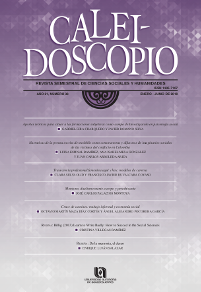Narratives of the written press of Medellin as constructors and diffusers of social imaginaries of the victims of the conflict in Colombia
DOI:
https://doi.org/10.33064/38crscsh913Keywords:
social imaginaries, conflict, media, victims, discourse.Abstract
This research analyzed the process through which the written press of Medellin, El Mundo and El Colombiano, build up and reproduce social imaginaries of the victims of the armed conflict in Colombia, within the framework of the “Peace Dialogues” that have been developed since 2012 in Havana, Cuba, through the rhetorical figures used in their editorials. The methodology used for this research was qualitative and implemented the technique of documentary analysis as a strategy for data collection and discourse analysis as a methodology for understanding and distinguishing the forms of construction and diffusion, as well as the identification of some imaginaries. The result from this process makes it possible to affirm that the media attributed the voice of the victims, insofar as they show a broad knowledge about their characteristics, about the distinctions that exist between them, and about the needs that seem to be demanding respect to the “Peace Process”.
Downloads
Metrics
Downloads
Published
How to Cite
Issue
Section
License
Licencia Creative Commons Atribución-NoComercial-CompartirIgual 4.0 Internacional
El lector es libre de compartir o adaptar el material en cualquier medio o formato bajo las condiciones siguientes: (a) debe reconocer adecuadamente la autoría, proporcionar un enlace a la licencia e indicar si se han realizado cambios; (b) no puede utilizar el material para una finalidad comercial y (c) si remezcla, transforma o crea a partir del material, deberá difundir sus contribuciones bajo la misma licencia que el original.
Resumen de la licencia
https://creativecommons.org/licenses/by-nc-sa/4.0/deed.es_ES
Texto completo de la licencia
https://creativecommons.org/licenses/by-nc-sa/4.0/legalcode
Cada autor es responsable del contenido de su artículo. En el caso de un texto colectivo, el primer autor asume la responsabilidad intelectual de los resultados del proceso editorial; los autores son responsables de obtener la licencia de autor para reproducir materiales gráficos o fotográficos que pertenecen a terceros.
Los autores asumen plena responsabilidad en el caso de falsificación de datos o falta de autenticidad en la investigación. Se comprometen, también, a no reutilizar trabajos ya publicados, total o parcialmente, para presentarlos en otra publicación.
Estas condiciones aplican tanto a la versión impresa como a la versión electrónica de la revista.





















